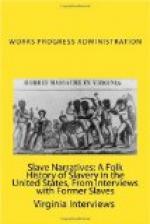Truth to idiom is more important, I believe, than truth to pronunciation. Erskine Caldwell in his stories of Georgia, Ruth Suckow in stories of Iowa, and Nora Neale Hurston in stories of Florida Negroes get a truth to the manner of speaking without excessive misspellings. In order to make this volume of slave narratives more appealing and less difficult for the average reader, I recommend that truth to idiom be paramount, and exact truth to pronunciation secondary.
I appreciate the fact that many of the writers have recorded sensitively. The writer who wrote “ret” for right is probably as accurate as the one who spelled it “raght.” But in a single publication, not devoted to a study of local speech, the reader may conceivably be puzzled by different spellings of the same word. The words “whafolks,” “whufolks,” “whi’foiks,” etc., can all be heard in the South. But “whitefolks” is easier for the reader, and the word itself is suggestive of the setting and the attitude.
Words that definitely have a notably different pronunciation from the usual should be recorded as heard. More important is the recording of words with a different local meaning. Most important, however, are the turns of phrase that have flavor and vividness. Examples occurring in the copy I read are:
durin’ of de war outmen my daddy (good, but unnecessarily put into quotes) piddled in de fields skit of woods kinder chillish
There are, of course, questionable words, for which it may be hard to set up a single standard. Such words are:
paddyrollers, padrollers, pattyrollers for patrollers missis, mistess for mistress marsa, massa, maussa, mastuh for master ter, tuh, teh for to
I believe that there should be, for this book, a uniform word for each of these.
The following list is composed of words which I think should not be used. These are merely samples of certain faults:
1. ah for I 2. bawn for born 3. capper for caper 4. com’ for come 5. do for dough 6. ebry, ev’ry for every 7. hawd for hard 8. muh for my 9. nekid for naked 10. ole, ol’ for old 11. ret, raght for right 12. sneik for snake 13. sowd for sword 14. sto’ for store 15. teh for tell 16. twon’t for twan’t 17. useter, useta for used to 18. uv for of 19. waggin for wagon 20. whi’ for white 21. wuz for was
I should like to recommend that the stories be told in the language of the ex-slave, without excessive editorializing and “artistic” introductions on the part of the interviewer. The contrast between the directness of the ex-slave speech and the roundabout and at times pompous comments of the interviewer is frequently glaring. Care should be taken lest expressions such as the following creep in: “inflicting wounds from which he never fully recovered” (supposed to be spoken by an ex-slave).




